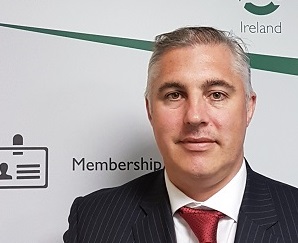Budget 2019 delivers welcome news for the freight distribution and logistics sector by refraining to increase carbon tax and the price of diesel, according to FTA Ireland (FTAI).
 Aidan Flynn, FTAI General Manager, said: “With Brexit only 171 days away, the industry needs as much support as possible to enable it to prepare for the new trading relationship with the UK. The announcement of over €110m for Brexit measures across many government departments, including essential customs requirements, is welcome. However, it is of critical importance that this funding goes beyond regulatory bodies – such as the Revenue and Customs and veterinary inspectors – to include SME businesses in the haulage sector in their preparation of new customs and regulatory checks.
Aidan Flynn, FTAI General Manager, said: “With Brexit only 171 days away, the industry needs as much support as possible to enable it to prepare for the new trading relationship with the UK. The announcement of over €110m for Brexit measures across many government departments, including essential customs requirements, is welcome. However, it is of critical importance that this funding goes beyond regulatory bodies – such as the Revenue and Customs and veterinary inspectors – to include SME businesses in the haulage sector in their preparation of new customs and regulatory checks.
“The government has taken the opportunity to promote the transition from an over reliance on diesel in the commercial fleet sector to more environmentally friendly alternative fuels, such as compressed natural gas (CNG). The announcement of a new capital allowance scheme for gas-propelled vehicles and refuelling equipment is welcome, but this needs to be enacted immediately. FTA Ireland has members investing in CNG vehicles but there are no publicly available refuelling sites. This needs to be rectified as a matter of urgency to support operators that are making a commitment to running their fleet in a more environmentally friendly manner. Fuel costs account for over 33% of operational costs, it is therefore incumbent on the government to deliver a more strategic solution to aid the transition to cleaner fuels while promoting Brexit preparedness, by shying away from increasing costs for the industry.”
Ireland is under pressure from the EU to reduce its CO2 emissions, with the threat of significant fines if it does not comply. From 1 January 2021 Ireland will be one the few EU Member States which will have to buy carbon credits or ‘statistical transfers’ to offset the amount in tonnes of CO2 by which it misses its renewable energy and energy efficiency targets. But the commercial transport sector can deliver these savings now. If 10% of the articulated fleet moved to CNG fuel, this would result in a 5% reduction in Ireland’s annual 1m tonne CO2e target. This is worth €23m of the mooted €455m fines which Ireland will pay from 1 January 2021.
Aidan Flynn continued: “FTAI is calling on the government to immediately open built CNG stations and accelerate those planned for essential road users (ERUs). The investment and infrastructure is in place, the CNG trucks are delivered and fleet operators are willing to use this new technology.”
FTAI has also called for an ‘Apprenticeship Training Tax Credit’ to encourage employers in the logistics sector to engage in planning for their future by committing to progressive and sustainable training and education programmes such as the ‘Logistics Associate Apprenticeship’.
Aidan Flynn continued: “Without employer engagement and support, it will become very difficult to attract new entrants into the industry. The recently published report ‘Addressing the future skills needs arising from the potential trade implication of Brexit’, published by the Expert Group on Future Skills Needs, highlights that the industry will need over 30,000 new entrants from 2025. If schemes like this are not supported by government, the industry will be challenged to remain competitive and will be at a distinct disadvantage when delivering Brexit solutions to keep freight moving.”
Aidan Flynn concluded: “Brexit will place a strain on the whole economy and enabling businesses to trade in an environmentally efficient manner is good governance and prudent in these difficult times. We need a dynamic and competitive industry; adding costs and failing to offset these increases with viable alternatives will stifle business growth. With the problems of skills shortages, operational costs and adapting to the new Brexit reality, businesses need support and a collaborative approach from government and businesses, otherwise there will be devastating consequences for all the hard-working people in this industry. Much more must be done.”





